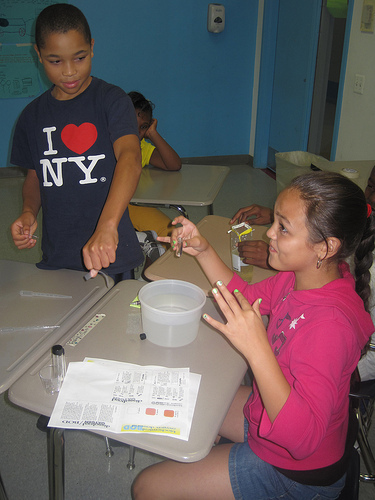America has fallen behind twenty other countries in science and math education and the trend is getting worse, not better.
This is not just about graduating more scientists and techies. This is a bigger challenge to develop a society that is literate in the technologies that are transforming our world. More and more jobs today at every level require key knowledge of technology. More and more public policy issues facing us involve science -- think of healthcare, climate change and energy.
The Presidential Council of Advisors on Science and Technology (PCAST) recently issued a report which looks at the underlying causes of our current crisis and makes recommendations on how to fix it.
One interesting finding is that it is not just a proficiency gap -- it is also an engagement gap. We are literally boring our kids out of science and math. A lot of this is due to how we teach these subjects. Instead of tapping into the innate curiosity of every kid and letting them discover the world on their own, we emphasize rote learning and procedures. No wonder the kids are turned off.

Do you have to train a 3-year old how to be curious? No, just wind-up and let them go -- they are little discovery engines who will explore every object around them whether you like them touching the crystal glasses or not. Yet, by the time kids are in 3rd or 4th grade, we have thrown so many textbooks and quizzes at them that it is no wonder that learning is seen as a chore by many kids - particularly in math and science.
The PCAST report calls for specific actions:
1. Create an ARPA-ED: an agency that will do for science education what ARPA (now known as DARPA) does for military technology and what ARPA-E does for clean energy research. ARPA-Ed can invest in new approaches to the use of technology in education, to learning assessment and other key issues.
2. Create 1000 new STEM schools: I have been to a number of schools across the US that are taking a fresh approach to science, tech, engineering and math (STEM). Students at these schools learn by doing, not from textbooks. They formulate their own questions, their own experiments, not just follow a set of procedures. If we had 1000 such schools, that would be a good start to spread this empowering approach.
3. Use technology to drive Innovation in Education: just putting computers in classrooms is not the answer. There are many ways to use technology, though, to engage kids. A program which I support called Nnational Lab Day (NLD) is connecting mentors from the real world of tech and science with K-12 kids to do hands-on projects. NLD is highlighted in the PCAST report among other great programs.
The PCAST report has other strong recommendations as well.
If you watch Waiting for "Superman" you will get a sense of the challenges facing our kids and schools today. What will you do about it?